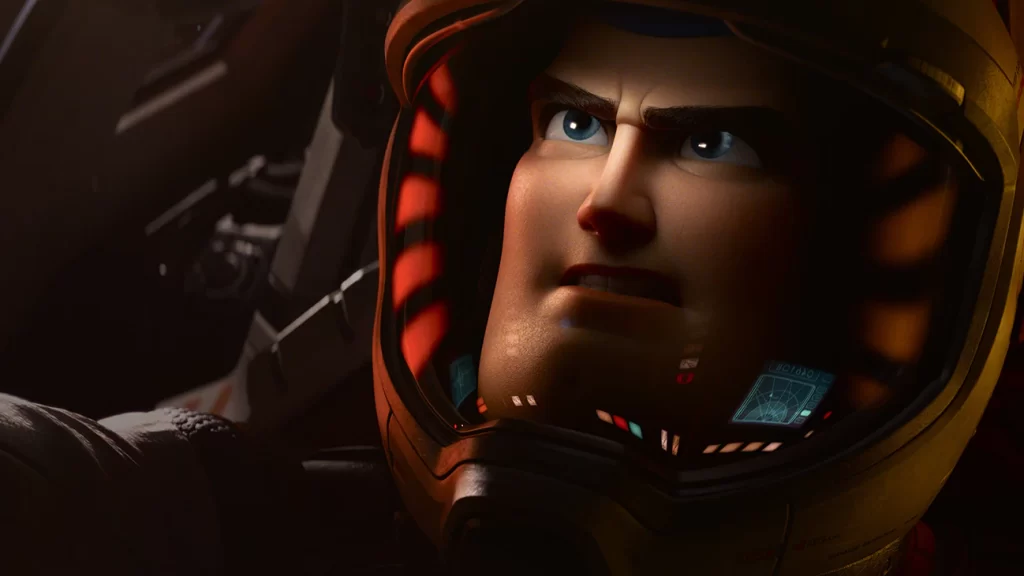No one is going to mistake Lightyear for a return to form for Pixar, but its littered small pleasures make for an inoffensive animated space yarn.
Lightyear opens with a title card that explains how this latest Pixar entry fits into the Toy Story universe, detailing how in 1995 young Andy received a gift relating to his favorite movie, ending with the words: “This is that film.” The message is concise and clear, imparting all the information the viewer needs as they are thrust into the story proper, which is basically the saga of a young, beefy space ranger by the name of Buzz Lightyear (Chris Evans) partaking in all manner of derring-do. Let’s get some duh information quickly out of the way: Lightyear is nothing more than an exercise in brand extension. But that doesn’t mean it isn’t enjoyable. Director-writer Angus McLane and co-writer Jason Headley have crafted a tale sure to please more than a few eight-year-old boys out there — as well as their sisters, moms, dads, and maybe even a few grandparents.
The story itself is fairly straightforward: a routine stop at a distant planet proves disastrous for Buzz and the ship’s 1200 passengers, the Space Ranger’s familiar over-confidence and brashness the cause of their marooning on this planet, the result of a crash that could have been avoided had Buzz heeded the warning signs. With their hyper-speed crystal destroyed — you know, the crystal that lets the ship travel at hyper-speed — the crew sets up camp as they try to formulate and produce a new one. Days eventually turn into years, and with a prototype finally ready, Buzz attempts a trial run that ultimately proves unsuccessful. But this four-minute flight is actually the equivalent to four years for everyone but Buzz, as the faster he travels toward the future, the more time he loses. The result is Buzz staying the same age as everyone around him grows old, including his partner and best friend, Captain Alisha Hawthorne (Uzo Aduba). In a stunning montage — and the best sequence in the entire film — we watch as Buzz makes various flight attempts, returning each time to see Hawthorne a little bit older, living a fulfilling life that includes marriage and a family, while Buzz obsessively tries to right his wrongs. It’s only upon her death that Buzz is finally able to crack the code with the help of his trusted companion, a robotic cat named Sox (Peter Sohn). However, upon his latest arrival to declare the good news, he discovers that the planet has been overtaken by a race of robots called the Zurgs, and he must team up with a ragtag group of amateurs and outsiders if he hopes to save the day, including Hawthorne’s space-fearing granddaughter Izzy (Keke Palmer), an ex-con named Darby (Dale Soules), and the clumsy and clueless Mo (Taika Waititi). Oh, and Buzz hates rookies, because he’s an egomaniac.
A lot of moving parts there, but that synopsis only covers about two-thirds of film, which is a peculiar detail only in that Lightyear is one of those films that is remarkably plot-heavy while simultaneously feeling like nothing much ever happens. In fact, so many of the big action set pieces are predicated on either space ships crashing or malfunctioning that it almost starts to feel like a joke, especially when the big climactic showdown ends with… [SPOILER ALERT] another crash. Perhaps predictably, then, Lightyear works best in its first half, when it’s dealing with the repercussions of Buzz’s time travel. Infused with some of that old-fashioned, emotionally affecting “Pixar magic,” it’s admittedly not the most original plot development, especially this deep into Pixar’s animation-dominating run, but it feels novel in comparison to the tired clichés peddled in the film’s back-half, a sampling of Buzz’s epiphanies including that it’s okay to need people sometimes and that one should never judge a book by its cover. Whoa.
Much has been made of the fact that this is Pixar’s first theatrical release in over two years, as their trio of original features in that span — Soul, Luca, and Turning Red — were offloaded to Disney+. It’s not the least bit shocking that Disney would choose to make Lightyear purely theatrical, as the Toy Story series has raked in literally billions of dollars worldwide for the Mouse House. And quite frankly, Lightyear isn’t significantly better or worse than those aforementioned titles, which may have been free of formerly established IP but were far from crown jewels in the Pixar crown. Lightyear doesn’t even aspire to such heights, content to offer up an old-fashioned space yarn that is intermittently exciting and hits the feels a few times. One element of Pixar’s work that rarely flags is its animation, and its again top-notch here, the photorealistic backgrounds as stunning as ever, with even small details — such as Buzz’s shortened hair slightly blowing in a soft breeze, or first-person POV shots inside of space suits including reflections of the characters’ faces — proving especially impressive. But despite the film’s deep-rooted nostalgia and the franchise’s long-standing appeal, conservative extremists have found time and cause to call for a boycott of the film because it includes a same-sex kiss between two women, as Alisha is gay. The moment is as brief and straightforward as when Buzz asks “Who is she?” upon learning of Alisha’s engagement, which is an arguably far richer and more affecting moment thanks the deep relationship it articulates. This is Buzz’s friend. He loves and supports her. Lightyear‘s strengths lie in these small moments rather than in the grand conceptual gambits of Pixar’s yesteryear, and while no one is going to mistake this latest effort for another animated classic from the studio, viewers looking for 105 minutes of entertaining fluff could do a lot worse.


Comments are closed.